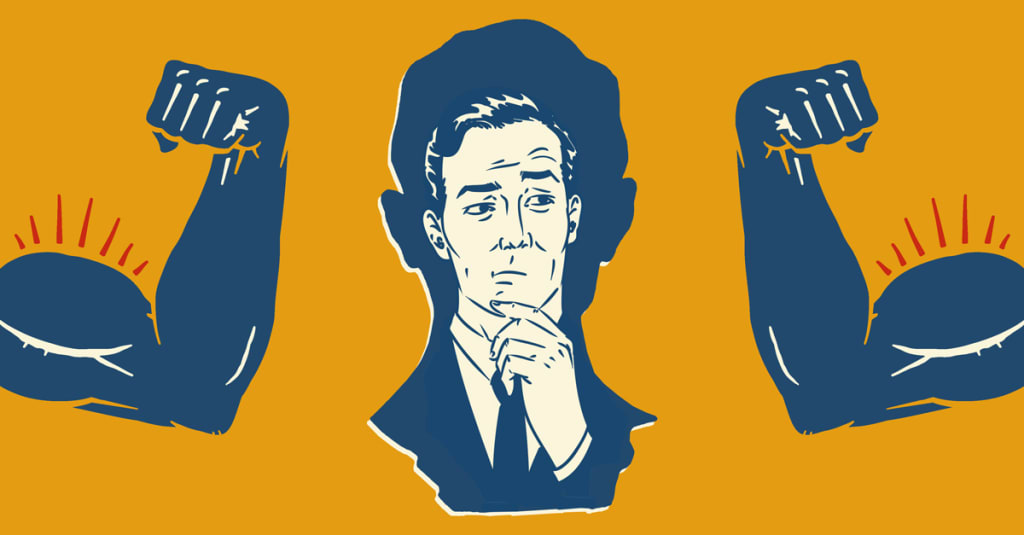The Changing Face of Masculinity: Navigating a Complex and Evolving Landscape
Understanding the Historical, Cultural, and Social Factors That Shape Masculinity in Today's World

Introduction:
Masculinity is a complex and multifaceted concept that has been shaped by historical, cultural, and social factors. It is a term that refers to the characteristics, behaviors, and roles that are traditionally associated with men, including traits such as strength, courage, and assertiveness. However, the definition of masculinity has evolved over time and continues to do so, as society grapples with changing gender norms and expectations. In this article, we will explore the various factors that shape masculinity in today's world and examine the challenges and opportunities that arise from this evolving landscape.
Historical Factors:
To understand masculinity, it is important to consider its historical roots. Masculinity has been shaped by centuries of societal norms and expectations, which have varied widely across cultures and time periods. For example, in ancient Sparta, masculinity was associated with military strength and physical prowess, while in Victorian England, it was associated with emotional restraint and intellectual superiority. These historical factors continue to influence our understanding of masculinity today, as men continue to grapple with societal expectations and norms.
Cultural Factors:
Cultural factors also play a significant role in shaping masculinity. Across cultures, masculinity is often associated with certain behaviors and roles, such as being a provider or protector. In some cultures, masculinity is closely linked to physical strength, while in others it is associated with emotional intelligence or spiritual well-being. These cultural factors can influence how men view themselves and their roles in society, and can shape their understanding of what it means to be a man.
Social Factors:
Finally, social factors such as media and politics also play a role in shaping masculinity. The media, for example, often reinforces traditional gender roles and expectations, portraying men as strong, aggressive, and dominant. Similarly, politics can have a significant impact on how masculinity is defined and understood, with political leaders often embodying and reinforcing certain masculine ideals.
Challenges and Opportunities:
As the definition of masculinity continues to evolve, men face both challenges and opportunities. On the one hand, men may feel pressure to conform to traditional masculine ideals, even as those ideals become increasingly outdated. This can lead to feelings of isolation, depression, and anxiety. On the other hand, the changing face of masculinity also presents opportunities for men to redefine themselves and their roles in society, to embrace a more inclusive and compassionate understanding of what it means to be a man.
To further explore the topic of masculinity, it is important to consider how it intersects with other social identities and experiences. For example, masculinity is often closely linked to race, with different racial groups having distinct and varied understandings of what it means to be a man. Similarly, sexuality and gender identity can shape how men view themselves and their roles in society, with LGBTQ+ men facing unique challenges and experiences.
In recent years, there has been a growing recognition of the harmful effects of toxic masculinity, which refers to the ways in which traditional masculine ideals can be harmful to both men and those around them. Toxic masculinity can lead to aggressive behavior, sexism, and homophobia, among other negative outcomes. By understanding the roots of toxic masculinity and working to dismantle it, men can promote healthier and more positive forms of masculinity that benefit everyone.
Another important consideration is how masculinity intersects with mental health. Men are often socialized to avoid showing vulnerability or seeking help for mental health issues, leading to high rates of untreated depression and suicide. By encouraging men to seek help when needed and promoting mental health awareness, we can improve the overall well-being of men and those around them.
Finally, it is important to recognize that there is no one "right" way to be a man. Masculinity is a diverse and multifaceted concept, and men should feel free to express themselves in ways that feel authentic and true to their own experiences. By embracing a more inclusive and diverse understanding of masculinity, we can create a society that values and celebrates men in all their complexity.
Conclusion:
In conclusion, masculinity is a complex and multifaceted concept that is shaped by a variety of factors. To navigate this evolving landscape, it is important to consider the historical, cultural, and social factors that shape masculinity, as well as its intersections with other social identities and experiences. By promoting healthy and positive forms of masculinity, challenging toxic masculinity, and encouraging men to seek help when needed, we can create a more just and equitable society for all. Ultimately, the goal should be to create a world in which men are free to express themselves in ways that feel authentic and true to their own experiences, without fear of judgment or discrimination.
About the Creator
Muhammad Hamza
I'm Hamza, Passionate writer on personal growth, wellness, and technology. Providing compelling insights and thought-provoking content for an exciting journey of discovery.Join me on this exciting journey of exploration and discovery.
Enjoyed the story? Support the Creator.
Subscribe for free to receive all their stories in your feed. You could also pledge your support or give them a one-off tip, letting them know you appreciate their work.






Comments
There are no comments for this story
Be the first to respond and start the conversation.